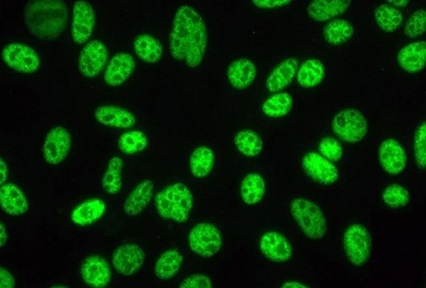Nikhil Prasad Fact checked by:Thailand Medical News Team Jun 14, 2024 1 year, 6 months, 1 week, 5 days, 7 hours, 26 minutes ago
COVID-19 News: In a groundbreaking study conducted by researchers at the University of Foggia-Italy, a surprising link has been discovered between autoantibodies and the severity of COVID-19. This study covered in this
COVID-19 News report and conducted at the Policlinico Riuniti Hospital-Italy, sheds light on how the body's immune response can turn against itself, worsening the outcomes for patients infected with SARS-CoV-2.
 Link Between Antinuclear Antibodies and COVID-19 Severity
What are Antinuclear Antibodies (ANAs)?
Link Between Antinuclear Antibodies and COVID-19 Severity
What are Antinuclear Antibodies (ANAs)?
Antinuclear antibodies (ANAs) are a type of autoantibody that target substances found in the nucleus of cells. They are commonly associated with autoimmune diseases, where the body's immune system mistakenly attacks its own tissues. However, this study reveals that even in patients without pre-existing autoimmune conditions, the presence of ANAs can significantly impact the severity and mortality of COVID-19.
The Study at a Glance
The research involved 638 patients hospitalized with COVID-19 between April 2020 and March 2021. These patients were tested for ANAs, and their health outcomes were closely monitored. The study found that those with positive ANA tests had a markedly lower 30-day survival rate (64.4%) compared to those without ANAs (83.0%). Additionally, ANA-positive patients were more likely to suffer severe respiratory complications during their hospital stay (35.4% vs. 17.0%).
Introducing the HALP Score
To further understand the implications of ANA presence, the researchers used the Hemoglobin-Albumin-Lymphocyte-Platelet (HALP) score. This score combines several blood parameters to assess a patient's nutritional and inflammatory status. A lower HALP score was significantly associated with ANA-positive patients, indicating worse health outcomes. Specifically, patients with a low HALP score had a significantly lower 30-day survival rate and a higher incidence of severe respiratory complications.
The Numbers Speak
-30-day Survival Rate: 64.4% for ANA-positive vs. 83.0% for ANA-negative
-Severe Respiratory Complications: 35.4% for ANA-positive vs. 17.0% for ANA-negative
-HALP Score: 108.1 for ANA-positive vs. 218.6 for ANA-negative
These statistics highlight the stark contrast in health outcomes based on ANA status and underline the importance of monitoring these autoantibodies in COVID-19 patients.
Why ANAs Matter in COVID-19
The immune system's response to SARS-CoV-2 can sometimes go into overdrive, leading to the production of autoantibodies. These autoantibodies can exacerbate the disease by attacking the body's own tissues. In COVID-19, this response can lead to severe inflammation, organ damage, and increased risk of death.
rong>A Closer Look at Inflammation
Inflammation is a key factor in the severity of COVID-19. Patients with high levels of inflammatory markers, such as C-reactive protein (CRP) and ferritin, often experience more severe symptoms. The study noted that ANA-positive patients had higher levels of these markers, correlating with worse outcomes. However, the HALP score proved to be a more comprehensive indicator, considering both inflammation and nutritional status.
Real-Life Implications
For healthcare providers, understanding the role of ANAs and the HALP score in COVID-19 can improve patient care. By identifying those at higher risk, doctors can tailor treatments more effectively, potentially improving survival rates and reducing complications.
Future Directions
This study opens the door to further research on the role of autoantibodies in COVID-19 and other infectious diseases. It suggests that monitoring ANA levels and HALP scores could become standard practice in managing COVID-19 patients, especially those with severe symptoms.
Conclusion
The discovery of the link between ANAs and COVID-19 severity is a crucial step in understanding how the virus affects the body. It highlights the complexity of the immune response and the need for personalized approaches to treatment. As the fight against COVID-19 continues, studies like this provide valuable insights that could save lives.
The study findings were published in the peer reviewed journal: Biomedicines.
https://www.mdpi.com/2227-9059/12/6/1306
For the latest COVID-19 News, keep on logging to Thailand Medical News.
Read Also:
https://www.thailandmedical.news/news/breaking-french-study-discovers-that-autoantibodies-neutralizing-type-i-interferons-found-responsible-for-20-percent-of-all-covid-19-deaths
https://www.thailandmedical.news/news/canadian-study-shows-even-after-a-year-up-to-41-percent-of-post-covid-individuals-still-have-autoantibodies-that-causes-autoimmune-issues
